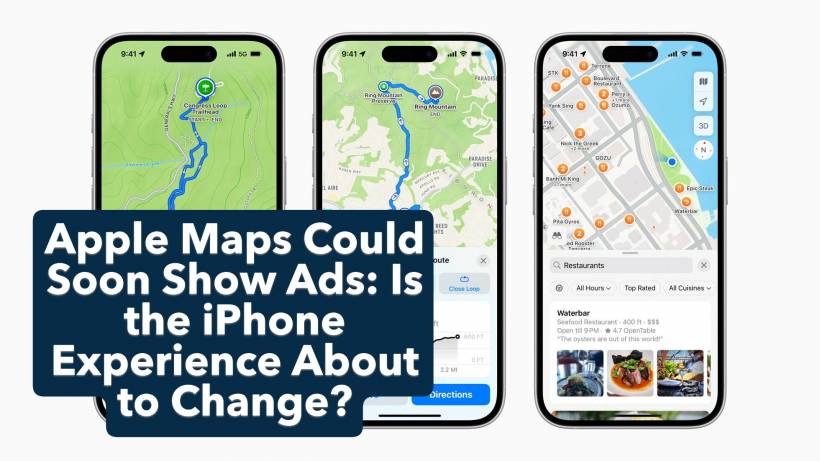For years, Apple has prided itself on creating an ecosystem that feels clean, premium, and—most importantly—free from the clutter of ads. But that might soon change. Reports now suggest that Apple is preparing to bring advertisements into Apple Maps, a move that could reshape how users experience one of iOS's core apps.
According to a report from Bloomberg's Mark Gurman, ads could start appearing in Apple Maps as early as next year, signaling a major shift in Apple's broader business strategy toward advertising revenue.
The Bigger Picture: Apple's Push Into Ads
Apple has slowly but surely been expanding its advertising footprint within its ecosystem. What started as Search Ads in the App Store—where developers can pay to have their apps appear at the top of search results—may soon spread to other built-in apps like Maps, Podcasts, and Books.
The motivation is clear: even with record-breaking hardware sales and service revenue, Apple wants to diversify its income streams. And advertising—done in Apple's famously "privacy-friendly" way—is a logical next frontier.
How Ads Might Work in Apple Maps
So, what would ads in Apple Maps look like? Early reports indicate that the feature would function similarly to App Store Search Ads. Businesses such as restaurants, hotels, or shops could pay to have their listings appear more prominently when users search for nearby places.
For example, if you search for "pizza near me," the first result might be a promoted listing from a restaurant that paid to appear at the top. Apple is reportedly working on a more refined and visually appealing interface compared to existing competitors like Google Maps—so don't expect garish pop-ups or banner ads.
Instead, Apple is likely to take a subtle approach, blending sponsored content into the app's native design language. That means the ads could look like standard map pins or location cards, labeled discreetly as "sponsored."
The AI Element: Making Ads "Useful"
Apple isn't just stopping at paid placements. The company is expected to leverage artificial intelligence to keep ad results relevant and non-intrusive. AI algorithms may analyze context—like time of day, travel patterns, or user preferences—to determine what kind of promoted locations make sense for each individual user.
For example, if you often stop at coffee shops in the morning, Maps might prioritize showing promoted cafés during your morning commute.
While the idea sounds convenient in theory, it does raise concerns about how much Apple will rely on behavioral data, even if it's anonymized. And given Apple's mixed track record in AI, from Siri's uneven performance to its cautious rollout of generative features, it's not yet clear how smoothly this will play out.
User Backlash on the Horizon?
Not everyone is thrilled by this direction. Apple has spent years positioning itself as the anti-ad company, often criticizing competitors like Google for monetizing user data. Introducing ads to a navigation tool—something users depend on daily—could be perceived as a betrayal of that philosophy.
Analysts have pointed out that the timing might not be ideal. Consumers are already frustrated with rising iPhone prices, subscription pushes, and constant reminders to upgrade iCloud storage or sign up for Apple TV+. Adding ads to that mix could make the experience feel less premium and more commercialized.
In essence, the company risks turning its flagship devices into what some are calling "digital billboards"—especially if the ads start appearing across multiple native apps.
Why Apple Might Still Win This Battle
That said, Apple's strength has always been in presentation and restraint. If any company can make advertising feel tasteful, it's Apple. The company's privacy policies, strict data protections, and clean UI design could help soften the blow.
If done right, these ads could even help small businesses stand out to local customers in a more curated, user-friendly way—something that Google Maps has arguably failed to balance.
Final Thoughts: A New Kind of Apple Experience?
There's no denying that this marks a turning point for Apple's ecosystem. For a company that built its reputation on seamless, ad-free experiences, this move could redefine what it means to use an iPhone in 2026 and beyond.
Whether Apple Maps becomes a smarter, more business-driven platform or just another ad channel depends entirely on how carefully Apple executes this rollout. One thing's for sure: the age of "ad-free Apple" is fading fast.




